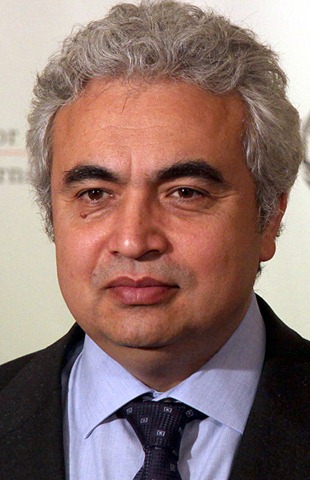Dr. Fatih Birol’s words of warning: Melting permafrost, cheap oil, and the end of the world as we know it
This summer, climate change, or global warming, has arguably established itself as a reality to be reckoned with. Greenhouse gases are heating up the earth’s atmosphere and, as a result, global weather conditions now seem to have gone truly haywire. Temperatures are unusually high in certain places, while rain in other places is causing unprecedented floods and loss of life. Pakistan, China, North Korea, and Niger are now threatened with floods such as they’ve never seen before. In view of the rise in temperature, some scientists even predict that there will be no more summer ice in the Arctic by 2030. And where will all that water go then? Our dependence on hydrocarbon products leads to more and more carbon dioxide being spewed into the atmosphere. But other greenhouse gases are also posing a risk. The Telegraph’s environment correspondent, Louise Gray, wrote last year that a “quarter of the land surface of the northern hemisphere contains permanently frozen soil, water and rock or ‘permafrost.’ When it melts it not only causes buildings to collapse and trees to fall over in ‘drunken forests,’ but releases carbon and methane from the dead organic matter in the soil.” And methane is a very dangerous greenhouse gas indeed — capable of trapping some 20 times more heat than carbon dioxide. University of Florida biologist Edward Schuur indicates that the estimated amount of methane in the earth’s permafrost could be as high as 1,600 billion tonnes. Schuur cautiously warns that, due to global warming, 100 billion tonnes of methane could be released from permafrost this century. He calls this escaping methane “a kind of slow-motion time bomb,” stressing, “Once this process starts it could soon become unstoppable.” At the beginning of this year, climate experts announced that methane emissions from the Arctic have risen by almost one-third in just five years and that sharply rising temperatures are to blame. It is a vicious circle, in other words. In spite of the clear and increasing danger posed by methane trapped in permafrost, the type of greenhouse gas that appears to be most easily kept in check and on our mind is probably carbon dioxide, as it directly relates to mankind’s favorite toy, the car. But oil has an even more pervasive presence in today’s world. The Energy Bulletin, a clearing house for information regarding the peak in global energy supply, notes: “Oil currently accounts for about 43 percent of the world’s total fuel consumption, and 95 percent of global energy used for transportation. Oil and gas are feedstocks for plastics, paints, pharmaceuticals, fertilizers, electronic components, tires and much more.” Dr. Fatih Birol, the Turkish chief economist of the Paris-based International Energy Agency (IEA), was interviewed by the Independent newspaper earlier this month and his words were quite dramatic: “One day we will run out of oil, it is not today or tomorrow, but one day we will run out of oil and we have to leave oil before oil leaves us, and we have to prepare ourselves for that day. The earlier we start, the better, because all of our economic and social system is based on oil, so to change from that will take a lot of time and a lot of money and we should take this issue very seriously.” Do the Turkish academic’s words strike a note of fear into our hearts? Is he really talking about the end of the world as we know it, a world without oil, yet filled with methane and other greenhouse gases?
Dr. Fatİh Bİrol’s words of warning
